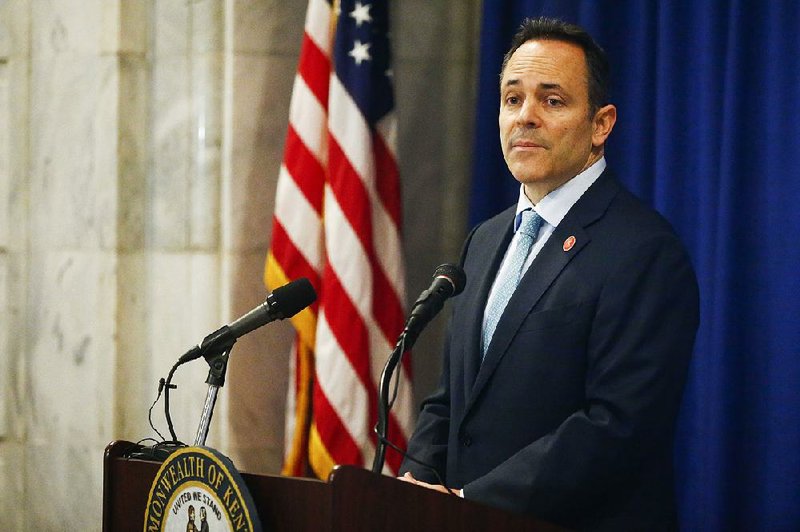FRANKFORT, Ky. -- Kentucky has become the first state to require many of its Medicaid recipients to work to receive coverage, part of an unprecedented change to the nation's largest health insurance program under President Donald Trump's administration.
The Centers for Medicare and Medicaid Services announced the approval Friday. The change will require adults between the ages of 19 and 64 to complete 80 hours per month of "community engagement" to keep their coverage. That includes getting a job, going to school, taking a job training course or community service.
It's a big change for Kentucky, a state that just four years ago embraced former President Barack Obama's health care law under a previous Democratic governor who won praise for posting some of the largest insurance coverage gains in the country.
But Republican Gov. Matt Bevin says that while more Kentuckians have insurance, it is not making them healthier. Kentucky, along with the rest of Appalachia, still falls behind the rest of the country in 33 out of 41 population health indicators, according to a recent study. Bevin says he believes his program, with its emphasis on work and community service, will encourage people to be healthier.
"There is dignity associated with earning the value of something that you receive," Bevin said. "The vast majority of men and women, able-bodied men and women ... they want the dignity associated with being able to earn and have engagement."
In its application to Washington, Bevin's office said it expects the changes to save taxpayers more than $300 million over the next five years. They estimated as many as 95,000 people could lose their Medicaid benefits, either because they did not comply with the new rules or they lose their eligibility because they make too much money.
"The Trump administration has agreed to end health coverage for 95,000 Kentuckians," said Democratic U.S. Rep. John Yarmuth, who represents Louisville. "Thousands of Kentucky families will face financial ruin."
Bevin's office said the new rules only apply to the expanded Medicaid population, or about 350,000 Kentuckians, about half of whom already have jobs. But there are many exemptions. The work requirements will not apply to pregnant women, full-time students, former foster care youth, primary caregivers of children and the elderly and full-time students.
The work requirements -- which start in July and will last five years -- also do not apply to anyone designated "medically frail," a broad term that includes people suffering from alcohol or drug addiction in a state that has been among the hardest hit by the opioid crisis.
"Why should an able-bodied working-age man or woman with no dependents not be expected to do something in exchange for that which they are being provided?" Bevin said. "I'm not worried about it at all."
Bree Pearsall is worried. She and her husband, Ben Abell, are full-time farmers of about 200 acres just south of Louisville. Pearsall said they depend on Medicaid to cover their family, which includes a 2-year-old and a new baby expected next month.
Under the new program, Pearsall and her husband would have to let state officials know each time their wages change. If they don't, they could lose their insurance for up to six months as a penalty. Since they are self-employed, they don't have a regular paycheck, and their income fluctuates throughout the year.
"I see those being very big obstacles to maintaining consistent coverage," she said. "I'm definitely anxious about it."
Advocates for the poor have said work requirements will become one more hoop for low-income people to jump through, and many could be denied needed coverage because of technicalities and challenging new paperwork. Lawsuits are expected as individual states roll out work requirements.
Arkansas and several other states have requests to implement a work requirement for its Medicaid recipients pending before the federal government. Arkansas' request would affect the more than 285,000 Arkansans enrolled in Arkansas Works, as the state's expanded Medicaid program is known.
The state proposes to require Arkansas Works enrollees to work at least 80 hours a month or spend an equivalent amount of time on approved activities, such as taking classes, looking for a job or volunteering. More than half of Arkansas Works enrollees would likely qualify for an exemption, Department of Human Services officials have said.
Information for this article was contributed by Ricardo Alonso-Zaldivar of The Associated Press and by Andy Davis of the Arkansas Democrat-Gazette.
A Section on 01/13/2018
